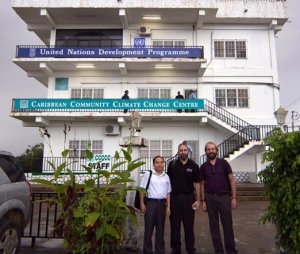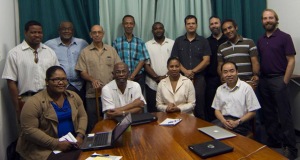Biology
WKU team tackles Caribbean climate change with international collaborators
- Wednesday, January 23rd, 2013
At the beginning of January, a group of faculty from WKU’s Department of Geography and Geology visited Belize for a two-day meeting hosted by the Caribbean Community Climate Change Centre (CCCCC), which included members of Cuba’s meteorological organization INSMET (Instituto de Meteorología) and the Belize National Meteorological Service.

WKU faculty members (from left) Dr. Xingang Fan, Dr. Jason Polk and Dr. Josh Durkee attended a meeting at the Caribbean Community Climate Change Centre in Belmopan, Belize.
The CCCCC serves as the regional information clearing house and advisor for climate change policy and guidelines for the Caribbean Community Member States (CARICOM). The Centre is recognized by the United Nations Framework Convention on Climate Change (UNFCCC) and the United Nations Environment Programme (UNEP), among other international agencies, as the focal point for climate change issues in the Caribbean.
The team included Dr. Xingang Fan, Assistant Professor of Meteorology; Dr. Josh Durkee, Assistant Professor of Meteorology; and Dr. Jason Polk, Associate Director of Science for the Hoffman Environmental Research Institute and Assistant Professor of Geoscience. Collectively, the WKU group’s expertise ranges from paleoclimate reconstruction and extreme event forecasting to downscale climate modeling, all of which are necessary for creating a framework by which long-term climate change impacts can be studied and understood for real-world applications.
As a result of the meeting, the group agreed to work together to launch an exploratory climate modeling project that will cover Bahamas, Jamaica, Belize and the Eastern Caribbean using the Weather Research and Forecasting Model (WRF v3), a modeling tool developed by the National Center for Atmospheric Research and the United States’ National Oceanic and Atmospheric Administration.
The use of WRF v3 to facilitate climate modeling in the Caribbean marks a major positive shift, according to Dr. Ulric Trotz, Deputy Director of the Centre. He says WRF will allow for downscaling regional climate projections to regional resolutions as high as 9 x 9 and 3 x 3 km, compared to existing regional efforts that produce 25 x 25 km resolution modeling output and even more obscure global resolutions that are as low as 300 x 300 km.
The team says the higher resolutions will allow regional climate change modeling experts to better project the likelihood of extreme weather events, coastal and water resource vulnerability, food security and agricultural issues, and forestry management challenges. These projects will in turn provide a more solid basis on which to make policy recommendations and develop societal and engineering solutions.
The January meeting complements a previous meeting held in December, when Dr. Leslie North, Associate Director of Education for the Hoffman Institute, and Dr. Polk visited Belize to meet with the CCCCC regarding a collaborative education and outreach initiative to address communication and education about climate change in the Caribbean. Planned activities include an infographic, short video and several children’s activity books about climate change in the Caribbean and risk management. These projects complement future modeling efforts, which will inform what information is necessary to communicate to stakeholders and the general public with regard to future climate and weather scenarios.
The high-resolution modeling has evolved from previous research conducted by Dr. Fan in conjunction with NASA, and illustrates the international recognition of research being conducted at WKU and the potential for future applications.

A team from WKU participated in a meeting hosted by the Caribbean Community Climate Change Centre. Front row (from left): Chalsay Gill, Dr. Kenrick Leslie, Kendra Clarke, Dr. Xingang Fan; back row: Ronald Gordon, Dr. Ulric Trotz, Carlos Fuller, Abel Cenfella, Harrison Cooper, Timo Baur, Dr. Jason Polk, Arnoldo Bezanilla and Dr. Josh Durkee.
“This modeling effort is innovative and WKU/CCCCC will be one of the first to attempt such high-resolution climate projections for the Caribbean,” Dr. Fan said. “Having these model projections and applying them to real-world issues will help in policy- and decision- making efforts by stakeholders.”
Dr. Durkee added: “In addition, we will be using novel technology, like the Tropical Rainfall Measuring Mission (TRMM) satellite, to help verify the model simulations and predict extreme weather and climate events in poorly monitored areas, particularly over the ocean and isolated island nations.”
“Our continued international collaboration with the CCCCC and other regional partners provides us the opportunity to engage our students and faculty in projects that provide vital information in dealing with future climate change scenarios in the region,” Dr. Polk said. “The CCCCC is a well-respected international organization, and it is a privilege to work with them to address such an important issue as the future well-being of the nations of the Caribbean in the face of climate change.”
Building this collaborative relationship with the CCCCC is a strong demonstration of WKU’s commitment to international reach and working to educate and engage its students in critical global issues, such as climate change and water resource vulnerability. The Hoffman Institute and Department of Geography and Geology continue to strive to provide applied research experiences for their students and faculty, and to develop cutting-edge research and international
Some of the links on this page may require additional software to view.

